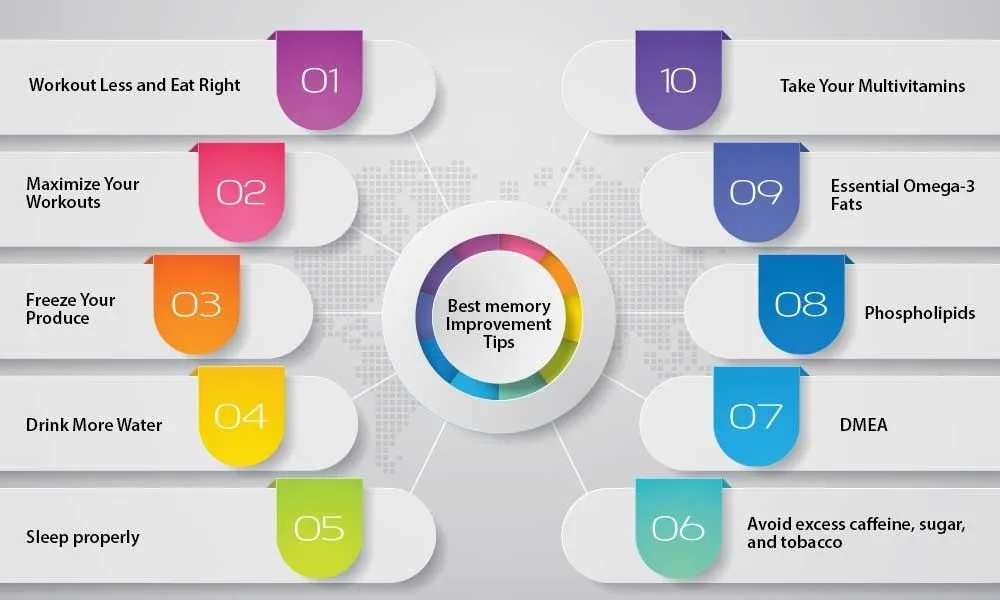You might have seen those TV shows and YouTube videos where the guest is busy telling you about how he or she can memorize all the lists on a screen. He amazes you as he reads out a list of several articles back and forth and upside down just as easily. That kind of stuff is called photographic memory and it usually comes from practice. Here’s how you too can try having one for yourself!
Our brain is a powerhouse of vital functions and processes, and it keeps a track of all that we see and hear. However, it is autonomous in the way that it selectively accepts and rejects several observations on its own. If you can’t recall or recollect something, it is due to your mind not picking it up after it has discarded it.
We know it could be frustrating. That’s why we are presenting 10 research-backed tips to improve memory and concentration that can help you a great deal to recollect any detail at any time. You may follow these quick and simple-to-follow memory improvement tips sitting on your couch too.
Personal training and staying positive in any situation is the key to living a happy life. Most people in the world are affected by mental issues like stress and low confidence, and these bad traits lead them to worse mental states like depression and PTSD. Such ailments can affect our ability to remember and recall any past observation or experience.
The best way to keep our minds sharp is to exercise regularly. It is also equally important to consume enough essential fats (like Omega-3 and Omega-6 acids) and phospholipids in the routine diet. That is because these nutrients keep the size of our brain cells active and in top shape. In short, our dietary and mental outlook always affect how mentally sharp we would turn out to be.
Here is a list of expert-approved ways that you can follow to have a strong memory (retention and recall) every day:
It’s simpler than it sounds. Instead of spending hours on the treadmill, you can reduce drinking calories like those from sodas, candy, and junk foods to control your weight or BMI profile. You should also opt for healthy, clean foods such as lean protein, healthy fats, whole grains, and fruits and veggies because they are packed with nutrients and come with very few calories.
This works because our mind needs adequate energy to keep working. If we eat nutritious foods that are packed with protein and fiber, it would help us get better results in less time. If we don’t eat that, we provide less than a useful amount of energy to the brain and this would make it work sluggishly.
Performing short bursts of intense exercises is a great way of getting in shape and robust memory. You can get the best of your health and weight loss experience with focused exercises like HIIT and Pilates, though they should always be done under expert guidance.
You would feel better and more confident after every workout session, and this would help your brain work better. It is so because regular exercise activates the ‘happiness hormones’ or endorphins, thus helping our brain work better and faster.
Going to the supermarket and bringing what’s already rotting at the back of your fridge is embarrassing. A solution for this is to purchase a week’s worth of produce on a Sunday and freeze them in proper portion sizes. This will prevent your fruits and veggies from going bad by preserving their freshness and nutrients.
You may use these fruits to make smoothies, stir-fries, and soups. They are delicious and full of nutrients that help you have better health and fitness.
Warning: If you eat stale and rotten fruits, you will fall sick and ruin all the good work that you had done for your fitness. This would also make you skip your workout sessions.
This is an old grandma’s tale but we can’t stress enough how important this is. Water keeps you hydrated and sustains all of your bodily mechanisms. It also keeps you full, boosts your metabolism, and increases the rate of fat burn. Hydration is key to boosting workout performance, keeping your mood light and lifted and your skin supple and glowing.
Research (ref: Cognitive Performance and Dehydration) says that even a small reduction of water levels in our body (even as little as 2%) can cause memory impairment and brain fog. Since our body is largely made of water, we can keep ourselves mentally sharp by drinking eight glasses of water every day.
Not getting at least six hours of proper sleep produces higher levels of cortisol, a stress hormone that affects your energy levels, productivity, and fat breakdown rate negatively. To combat sleep deprivation, you should turn off all electronic appliances an hour before you sleep.
You would also feel supercharged after a night of proper sleep and the same effect would be transmitted to your brain. Taken the other way around, one of the simplest memory improvement tips that you can follow in your home is ‘early to bed and early to rise…’
Can you improve your memory by taking multivitamins every day? Yes, you can. Taken as capsules or tablets, these supplements can help you maintain a healthy concentration of nutrients in your body. They would also help you get rid of issues related to nutrient deficiency like sleeplessness, drowsiness, mood swings, forgetfulness, and weight gain. It would also improve your cognitive performance.
Having an optimal intake of essential fats, especially omega-3 fats, is crucial for maintaining good brain development. This is because our brain is 60% fat by weight and DHA from omega-3 fats can be up to 20% of all fat in our brain. These fats form part of the structure of the brain cell membranes and they affect intelligence, aggression, mood, memory, and concentration.
It is a bit of a tongue twister to say but phosphatidylcholine or choline is probably the most important phospholipid to consider. It is used by the body to make a vital neurotransmitter in the brain. Having adequate intake helps to avoid poor memory and forgetfulness, thus boosting cognitive capabilities.
Research shows that taking a combination of choline with vitamin B5 during pregnancy may create the equivalent of a “superbrain” in the babies. It has proved effective in enhancing memory and overall mental performance, besides improving the health of the babies.
Tip: The foods rich in choline content are egg yolk, wheat germ, codfish, chicken, milk, cauliflower, spinach, and tofu. The best supplemental source is lecithin, which also supplies phospholipids.
Another nutrient found in fish, particularly anchovies and sardines, is DMEA. Unlike choline supplements, it passes easily into the brain and can be converted into choline. DMEA has been shown to elevate mood, improve memory, increase intelligence, and enhance physical energy.
Taking smart nutrients (like omega-3 fats, phosphatidylcholine, phosphatidylserine, vitamin B5, DMEA, and pyroglutamate) in combination is more effective than taking them individually.
It is important to reduce the intake of caffeine and sugar (coffee, tea, chocolate, and cola) because they impair memory. The same is true for refined carbohydrates too. This list can be appended to include exposure to toxins, especially those from air pollution and cigarettes.
These are some easy memory improvement tips that you can follow by making some small changes to your eating habits and lifestyle. Persisting with them would help you enjoy better benefits related to your physical and mental health.
If you have vitamin deficiencies, it can impair your memory’s overall cognitive function. To make sure you get enough of these important fats, you want to make sure to eat foods such as walnuts, sardines, salmon, beef, soybeans, tofu, flaxseeds, Brussels sprouts, moringa, and cauliflower.
You may also go for coffee, lemon water, fatty fish, broccoli, dark chocolate, nuts, ginseng, berries, and cabbage. In addition to them, eating seasonal fruits and drinking two glasses of milk every day helps too.
Instead of wondering how you may improve your memory and its recalling ability, you should try reminding yourself that you have a photographic memory. This may sound counterintuitive but psychiatrists agree that if you continue to strengthen your subconscious mind, it would reinforce your behavior about having a strong memory too.
Poor memory or short-term memory loss is often attributed to a lack of Vitamin B12. It is thus important to eat foods that are rich in this vitamin, like milk, eggs, red meat, chicken, fish, and green vegetables. It is just as important to stay hydrated and to drink about 4 liters of water every day.
Tip: A simple trick you can use is to attach a mental image with everything you read or experience.
Consuming alcohol with fatty foods damages the end of neurons, called dendrites that relay information from the sense organs to the brain. The damage continues with every single drink and it reduces the capacity of the sense organs to feel any damage being done. This is why people who get drunk do not feel pain or weather changes, even though the same may be affecting them.
As you choose to say goodbye to alcohol, these neurons start repairing themselves and their efficiency is also increased. This is also related to the liver and the digestive organs, and the better condition they are in, the quicker one may recover from the after-effects of alcohol. The brain functions, especially the ones related to memory and concentration, too are restored.
It is possible to think sharper and more clearly into the future through having an alcohol-free, whole foods diet. The key is to get started with them as soon as possible!

